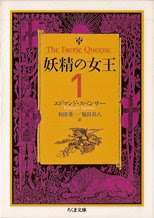I spent the last few days grading papers. As usual, it totally demoralized and nearly killed me (or at least my will to live). So, to shake things up a bit, I went back to have a look at the "argument" (introductory verse that summarizes the canto) of Canto 1, which, even in English, is fairly convoluted, and provokes gloss and commentary in the Japanese:
The Patron of true Holinesse,
Foule Errour doth defeate:
Hypocrisie him to entrappe,
Doth to his home entreate.
The translator seemed not to know whether to transliterate the names "Errour" and "Hypocrisie" into katakana (which appears in the notes and as furigana) or analogous kanji. I respect the dilemma, since these are just as much characters as they are allegorical representations. Calling a creature "Error" in English draws our attention right away to the connotation. A faithful Japanese rendering would be, as indicated by a furigana gloss, エラー. But "eraa" doesn't mean anything in Japanese, so the regular text uses 迷妄, めいもう, illusion, fallacy, delusion. Even "Holinesse" gets the kana treatment. The transliteration of "Hypocrisie," however, is too horrible to behold, and I dare not repeat it here.
The Japanese argument:
真の神聖の守護者は
汚らわし迷妄を打ち破り、
偽善はこの守護者を陥れようと
その館へいざなう。
I will try to render this in English:
The helper of true holiness,
Foul fallacy defeats;
Hypocrisy, this guardian to trap,
To his mansion tempts.
That's my attempt to reproduce some of the poeticism while still being quasi-literal in the translation. More boringly, this sentence says:
As for the guardian of true holiness, he defeats dirty illusion; as for hypocrisy, he intends to entrap this guardian by luring him to his palace.
Actually, it's difficult to translate completely literally without it sounding stilted. Spenser's original English is surprisingly close to the Japanese, even in word order. This is no doubt because Spenser is affecting an archaic style, which would tend to be more Germanic (German, like Japanese, has a SOV word order).
真 is glossed as まこと, even though it's just ま in the dictionary. If I'm interpreting the entry correctly, まこと is an older or obsolete reading of the kanji. It's interesting that it would even get furigana, as if the experience of reading the poem requires one to archaize, even mentally, familiar words, so the feel of the original is maintained (impossible in the ideogrammatic Japanese language, since an older reading is not noted by any visible morphology). We are, in effect, being told how to read the damn thing. 守護者 seems to be a word invented by the translator, though the meaning is clear enough. 陥れようとその館へいざなう sent me to the grammar guide, where I discovered that the volitional form of a verb plus と and another verb indicates that something is "about to happen" or is an intention. I had to confirm the meaning of 陥れる, which I thought was going to throw me, but it turned out to be a normal godan verb (that, naturally, looks like either a passive/potential or an ichidan verb). It is an unusual form, I think, but perhaps it's just a transitive form on the 'e' line. I don't know why いざなう is in kana or why it's in plain form.
By the way, I am using the following websites to (consistently) supplement my Kanji Learner's Dictionary and Kanji Fast Finder:
http://jisho.org/
http://www.saiga-jp.com/kanji_dictionary.html
Thanks also to the various Wikipedia articles on Japanese grammar and verb conjugations.
11.14.2008
Subscribe to:
Post Comments (Atom)





No comments:
Post a Comment